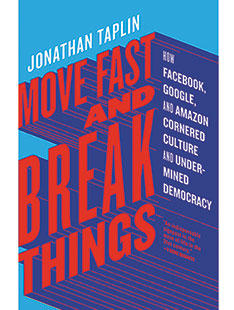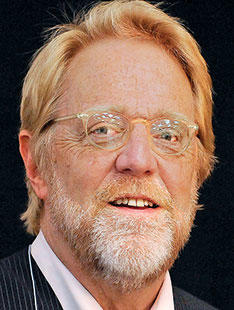
That might be because the modern moguls own many of the media platforms, but Jonathan Taplin ’69 insists that those companies, along with other tech giants, are just as great a threat to America as the plutocrats’ trusts were more than a century ago. That is one of the themes of his new book, Move Fast and Break Things: How Facebook, Google, and Amazon Cornered Culture and Undermined Democracy (Little, Brown).
Once upon a time, the internet was touted as the great democratizer, and Taplin, director emeritus at the University of Southern California’s Annenberg Innovation Lab, insists that it still can be. Contrary to popular mythology, though, many tech innovators espouse a libertarian or objectivist ethos perhaps best expressed by PayPal founder Peter Thiel, who once declared, “Competition is for losers.”

Although it might not be immediately apparent, the consequences for consumers and society have been dire. Taplin cites an old business adage: If you’re getting the product for free, you’re the product. Google and Facebook seem free, but users’ private data is mined and sold to advertisers, who are charged exorbitant monopoly rates. Amazon uses its leverage to drive down what it pays authors and publishers, who cannot survive without their book on the site. More people than ever are consuming books, music, and movies, but less money than ever is going to the artists.
“The internet is very good at creating winner-takes-all scenarios,” Taplin observes in an interview.
In 1965, Taplin got backstage at the Newport Folk Festival, where he met Albert Grossman, manager for Bob Dylan; Peter, Paul and Mary; Janis Joplin; and others. Grossman hired Taplin, while still a student, to be road manager for the Jim Kweskin Jug Band and Judy Collins. Taplin later managed Dylan, Levon Helm, and The Band, among others. Later, he produced two Martin Scorsese films and several acclaimed PBS documentaries. He later was an investment banker for Merrill Lynch, and in 1996 founded Intertainer, the first internet video-on-demand service.
Taplin proposes several internet reforms, such as declaring Google a natural monopoly and regulating it like the phone and electric companies. He also posits that authors, musicians, or filmmakers could form cooperatives to negotiate with YouTube or Google for fairer distribution prices.
Taplin advocates against “techno-determinism,” the belief that the internet simply represents the natural order of the universe. He cites self-driving vehicles, which could put tens of thousands of truck drivers out of work while making companies such as Google or Tesla rich.
“There is no reason to believe that just because Larry Page or Mark Zuckerberg think something should be a certain way, that that is the way the world should go. That is a decision that we as a society should make,” he says.
“I am not a Luddite. I believe in technology,” he says. “I’m just saying that the way they’re currently set up is wrong, and we have to rethink it. And then we can go forward again.”











No responses yet